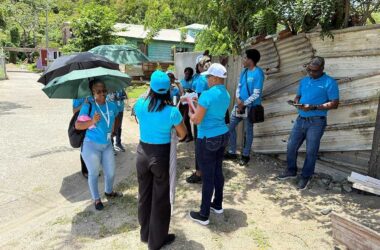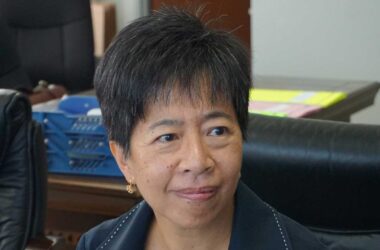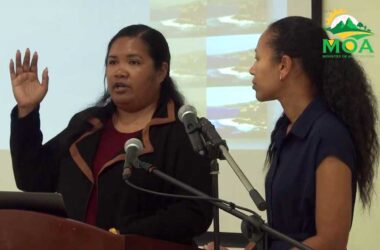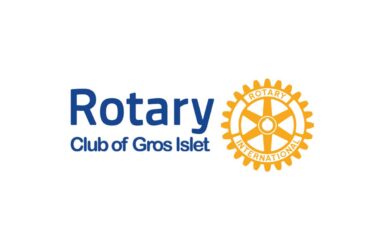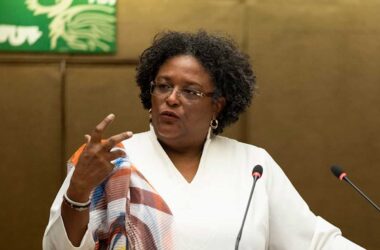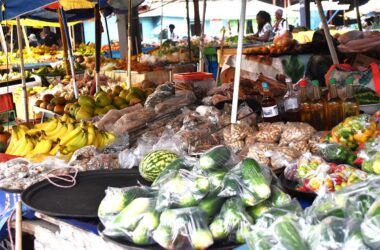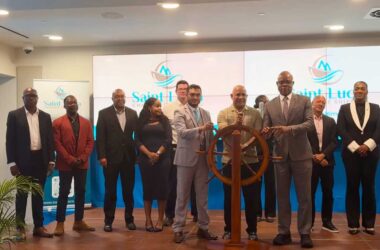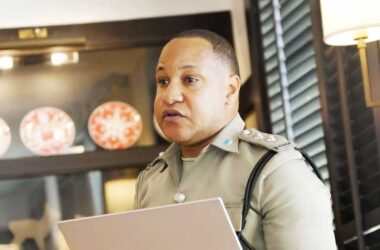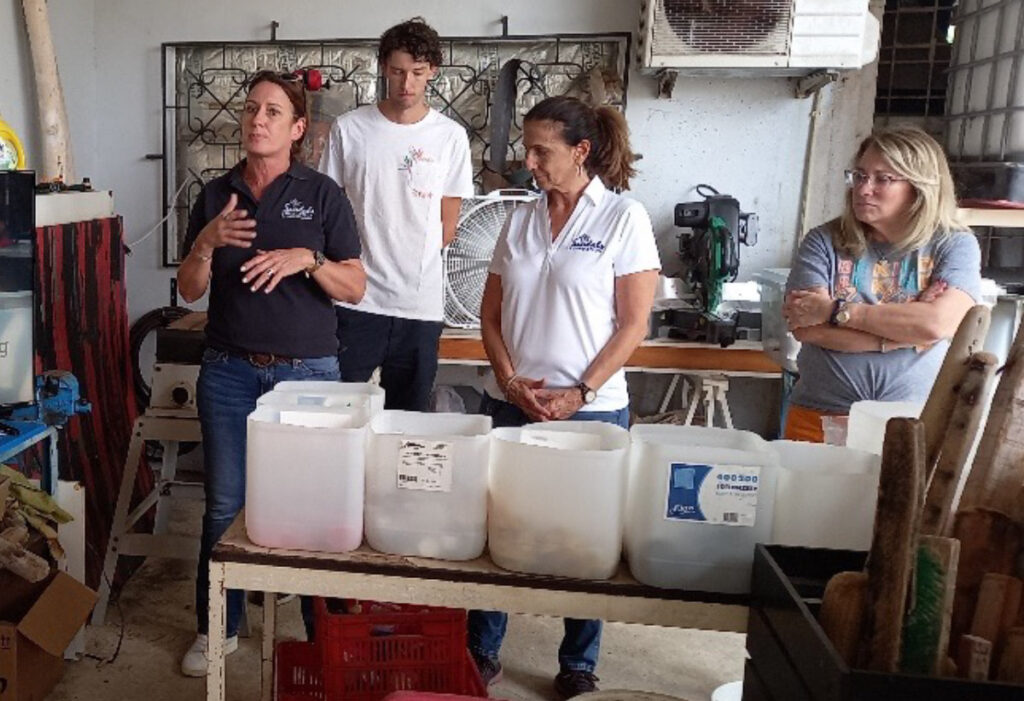
Everyone has future goals and entities have many and in the case of the Caribbean’s leading-branded luxury-included all-inclusive resort group, Sandals Resorts International (SRI), an unending one is helping Caribbean people, children included, to live their common dream goals, earlier than later.
The world’s eyes understandably on Sandals’ 6 properties on nine territories across the Caribbean, most would not see, in each location, the group’s constant but quiet application of its revolving future goal of helping people through environmental, educational and community initiatives.
But, for 13 years, the Sandals Foundation, SRI’s philanthropic arm, has been sponsoring goal-scoring initiatives helping young and old achieve their future goals – and in the case of Curacao where its latest stately royal resort has just opened, developing students through sports, together teaching and learning that “Waste isn’t always just waste,” according to Sandals Foundation Director Heidi Clarke.
Travel writers covering the June 24 formal opening of the Sandals Royal Curacao heard directly from Executive Chairman Adam Stewart about SRI’s own ultimate future goal: take its royalty service “to the moon”; and later saw how the Sandals Foundation and Curacao’s Limpi Foundation promote sports in schools through an interesting system that uses marine and community waste to create people-friendly products, including goalposts for school-based, mainly children’s pursuit and achievement of their future goals — for football.
The writers saw how it all starts with collection of simple thrown-away products like plastic bottle-stoppers, cans and bottles of different colors, shapes and sizes within any community and recovering from the seashores plastic, wood and other normal floating or sunken raw materials, to be processed by a small group of three young local engineering graduates who’ve applied their technological and scientific ingenuity from school to the an ongoing educational and fruitful process of transforming wasted goods into wanted products.
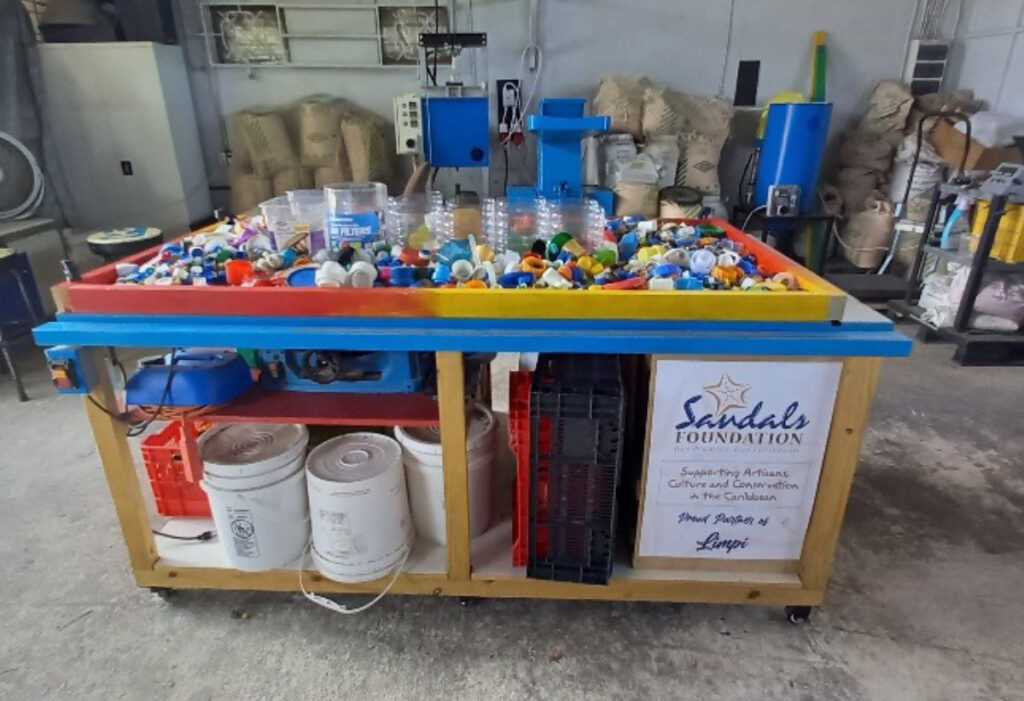
The plastic ‘waste’ is processed by type, size and color to be crushed into a kaleidoscope of flaky smithereens, then pressed and compressed through different mechanical units, including 3D printing, to produce everything from souvenirs and custom-made tourism products, to medals, pieces of art and simple Caribbean fashion jewelry, as well as building materials like beams and tabletops – plus much more…
And Future Goals is naturally the name of the Limpi project, which actually involves making small-size football goals to be used by child students with eyes and goals on becoming future footballers.
Using the discarded or abandoned wood and plastic products retrieved from the street-sides and the sea and processed through another set of specially-crafted home-made machines sponsored by Sandals, Limpi actually builds the small goals from scratch – or, more precisely, from a mixture of the earlier discarded land-and-sea raw materials.
And the nets for the goals aren’t knotted together by seaside fishermen or another of Limpi’s machines. Instead, they’re bits of or entire nets recovered from the ocean by the island’s marine unit, as net-fishing is outlawed in The Netherlands.
The writers were understandably a bit sore-eyed or groggy-headed on the morning after the opening night, but the human instinct inside each led to the large team of usual watchers and scribblers being so immersed-in and moved-by the explanations that, halfway through their brief stay at Limpi’s, almost all were actually helping process thousands of bottle caps and plastic bottles, while watching and listening.
It didn’t seem my colleague chroniclers had heard or realized an aspect of the story that was as important as the project’s use of sporting goals to promote personal future goals, so I popped the question: “Did you say that you actually make your machines?”
The smiling volunteers were glad to explain that all three have Degrees in Engineering and after their minds met at school they’d followed the same path to Limpi, applying their scientific, technological and IT knowledge to designing, adapting and creating the perfect machines for their worthy waste-to-wealth project.
Their work has overcome the space and the containerized toolshed and machine/electronic workshop are over-packed, but Sandals’ sponsorship of the machines has helped them create much more, faster and better.
The writers had shown much natural interests in the very visible transformations from waste to items with good taste, playing with and inquiring about the key chains, bracelets, medals and other tropical art pieces.
And each actually got a chance to create a product of their own through application of human energy to conversion of the new value-added waste into creation of 3D-inspired shapes, from max-sized clothes-pin styled paperclips, to attachment rings for side bags or backpacks, to an S-shaped cellphone stand.
But perhaps the best moment for each was achieving the sole goal of making their own creations (now and not in the future) from the recycled waste they’d just processed, through voluntary and innovative application of human energy to science and technology, each personally and individually creating his or her personalized and Limpi-branded product inscribed: ‘Made in Curacao BY ME’.
Heidi Clarke and her team explained Future Goals is also supported by the ever-popular Netherlands AFC Ajax soccer team, in what its website describes as “A program that turns fishing nets sourced from the ocean and recycled plastic waste into soccer goals for children.”
Between the Sandals Foundation, AFC Ajax and Limpi, almost 50 elementary schools throughout Curaçao are targeted to receive close to 100 Future Goals, backed by 600 soccer balls provided by Adidas — and complemented by a unique training program with AFC Ajax coaches on the field.
According to Clarke, “Coaches will mentor ‘Future Coaches’ recruited by the local Curaçao life skills program, Favela Street, on a robust eight-week curriculum for the children,” which “will focus as much on technique as it does on mindset, to foster the next generation.”
Future plans for Future Goals also include an island-wide tournament featuring all participating primary schools. However, quite apart from wanting to help children to actively pursue their future goals through football, AFC Ajax and Sandals have another intrinsic link that’s a common motivational denominator: Bob Marley.
SRI’s flagship motto ‘Love is all you need!’ symbolizes Marley’s epic song ‘One Love’, while AFC Ajax’s adopted inspirational anthem is Marley’s ‘Three Little Birds’.


